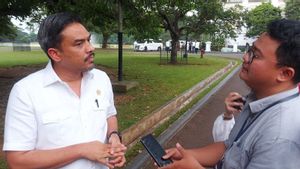JAKARTA - Starting last Monday, the students returned to school. However, in the midst of the COVID-19 pandemic, they are forced to start online learning or distance learning (PJJ). Unfortunately, PJJ is still dealing with internet infrastructure problems. Even in big cities like Jakarta, internet speeds are noticeably slow.
The implementation of PJJ is still faced with various problems, especially in the fields of infrastructure, internet and electricity. Quoting the Kompas daily, Monday, July 13, 2020, it was recorded that more than 47,000 educational units do not have access to electricity and the internet.
Meanwhile, according to data from the Ministry of Education and Culture in April 2020, it shows that 40,779 or around 18 percent of primary and secondary schools do not have internet access. Meanwhile, about 3 percent or around 7,552 schools have not had electricity.
"Of course it is very difficult to solve it if a remote area does not have access to electricity and the internet, but there is also Covid-19 (transmission). Online learning is not possible, while face-to-face cannot be realized, "said Deputy for Education and Religion Coordination of the Coordinating Ministry for Human Development and Culture Agus Sartono.
In Papua, for example, the Papua Education Quality Assurance Institute (LPMP) noted that there were 14 regions that could not implement PJJ at all during the COVID-19 pandemic. These areas include Puncak, Puncak Jaya, Yalimo, Central Mamberamo, Dogiyai, Deiyai, Intan Jaya, Lanny Jaya, Nduga, Asmat, Boven Digoel, Yahukimo, Bintang Mountains, and Mamberamo Raya.
Therefore, PJJ can only be implemented in big cities like Jayapura and Mimika. Even in cities, not all parents are able to provide internet quotas or buy gadgets for their children to join PJJ.
In addition, PJJ is also difficult to implement in Maluku. The problem is similar. Not all areas are covered by internet access and some families find it difficult to buy equipment that supports PJJ.
Internet messengers?
Talking about internet speed, according to the notes of The Economist Intelligence Unit ( EIU ), Indonesia is still below the average internet speed in Asia.
They noted that the average cellular download speed in Indonesia, according to them, is 14 Mbps. This figure is still far from the average download speed in Asia, which is 30.9 Mbps.
Meanwhile, Indonesia's average upload speed reaches 10.9 Mbps. However, it is still close to the average Asian upload speed of 12.9 Mbps.
Let alone in remote areas, in the capital city of Jakarta, the internet still feels messy. Based on the results Speedtest download speeds or download from the Internet Service Provider (ISP) IndiHome ranged between 15.75 Mbps. Meanwhile, the data upload or upload speed ranges from 5.61 Mbps.
The English, Chinese, Japanese, Arabic, and French versions are automatically generated by the AI. So there may still be inaccuracies in translating, please always see Indonesian as our main language. (system supported by DigitalSiber.id)













